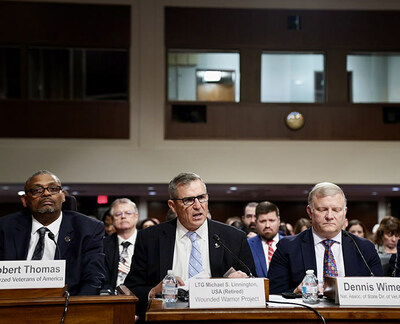Congressional "Minibus" Includes Historic Funding for MDMA-Assisted Therapy Trials
To combat PTSD and Veteran suicide, Congress directs the VA to fund nationwide trials of FDA-designated “Breakthrough Therapies,” including MDMA-Assisted Therapy.
WASHINGTON, March 11, 2024 /PRNewswire/ — Healing Breakthrough, the leading federal advocacy group for veteran access to MDMA-assisted therapy (MDMA-AT), celebrates the achievement of its FY24 advocacy goal: securing the first-ever Congressional appropriation for large-scale, nationwide trials of MDMA-AT. This effort was led by a courageous coalition of bipartisan legislators who are committed to combating PTSD and bringing the veteran suicide epidemic to an end.
MDMA-AT offers real hope to veterans who suffer from PTSD; a primary contributor to the suicide epidemic that has claimed over 130,000 veteran lives since 9/11. The second phase three MDMA-AT clinical trial found that 71% of trial participants no longer qualified for a PTSD diagnosis after three eight-hour MDMA-AT therapy sessions, while 87% experienced clinically significant improvement in their symptoms. Last month, the FDA granted MDMA-AT’s new drug application (NDA) “priority review” and assigned a Prescription Drug User Fee Act (PDUFA) target action date of August 11, 2024.
In addition to its advocacy work, Healing Breakthrough has also designed, developed, or facilitated five of the eight privately funded MDMAAT research studies at VA clinics and funded two of the five studies directly. Last year, the non-profit granted the VA’s National Center for Post-Traumatic Stress Disorder (NCPTSD) funding to assess the feasibility and safety of MDMA-AT in two first-of-kind clinical research pilots, one of which is led by the Executive Director of the NCPTSD, Dr. Paula Schnurr. This historic Congressional appropriation marks a shift from decades of philanthropically funded private research to public funding of the VA’s continued research and deployment of this FDA-designated “Breakthrough Therapy.”
“We are truly grateful to our Congressional champions, who’ve worked hand-in-hand with us to get federal skin in the game for MDMA-AT research,” said sixteen-year Marine Corps veteran Juliana Mercer, who serves as Healing Breakthrough’s Director of Veteran Advocacy and Public Policy. “From MDMA-AT’s designation in 2017 as an FDA ‘Breakthrough Therapy,‘ to the VA’s recent decision to fund MDMA-AT studies, to the FDA’s decision in February to fast-track MDMA-AT’s application for priority review, we’re witnessing the federal government take unprecedented action to bring healing to our hurting veterans. Healing Breakthrough will continue partnering with federal policymakers until our ultimate goal is achieved: making MDMA-AT accessible to veterans, safely and legally, through the VA healthcare system.”
For more information on Healing Breakthrough, please visit https://www.healingbreakthrough.org/.
PRESS CONTACT:
Jennifer Massey
(323) 240-5366
jennifer@vitamindpublicrelations.com
![]() View original content:https://www.prnewswire.com/news-releases/congressional-minibus-includes-historic-funding-for-mdma-assisted-therapy-trials-302085040.html
View original content:https://www.prnewswire.com/news-releases/congressional-minibus-includes-historic-funding-for-mdma-assisted-therapy-trials-302085040.html
SOURCE Healing Breakthrough


 Private Internet Access gives you unparalleled access to thousands
of next-gen servers in over 83 countries and each US state. Your
VPN experience will always be fast, smooth, and reliable.
Private Internet Access gives you unparalleled access to thousands
of next-gen servers in over 83 countries and each US state. Your
VPN experience will always be fast, smooth, and reliable.![DVIDS – Images – Iron Fist 24: LCAC Swap on the USS Green Bay [Image 7 of 7] DVIDS – Images – Iron Fist 24: LCAC Swap on the USS Green Bay [Image 7 of 7]](https://101veterans.com/wp-content/uploads/2024/02/dvids_logo_main.png)










